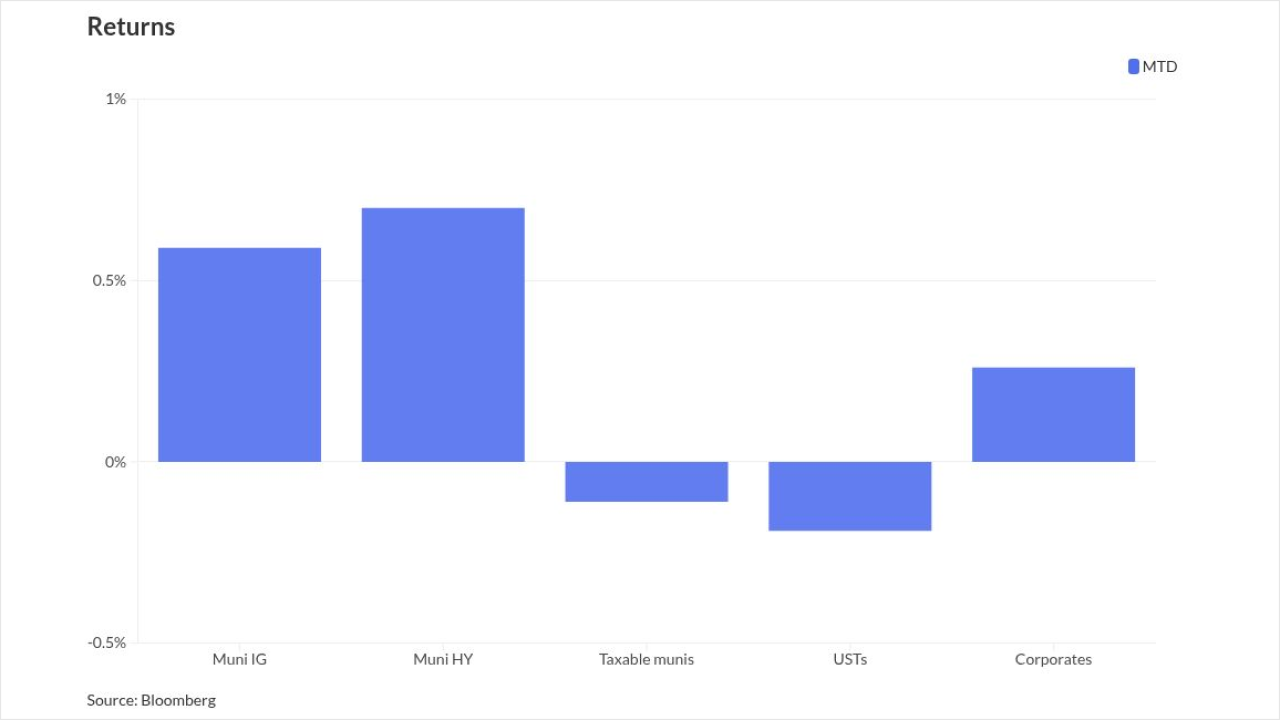
Charlotte Douglas International Airport in North Carolina plans to price next week the first of several major bond deals expected over the next few years to fund its expansion.
The airport said it will price $307 million on May 21, with an additional $745 million in issuance over the next five years. Proceeds will mainly be used for two capital projects — creation of a fourth parallel runway anticipated to open in fall 2027 and the renovation of the public Concourse D to open in late 2026.
Some funds will advance refund outstanding Series 2014A bonds, fund capitalized interest, fund a debt service reserve and pay issuance costs.
The first deal will be comprised of $281.9 million of tax-exempt Series 2025A revenue bonds and $25.1 million of alternative minimum tax eligible revenue bonds.
The Series 2025A bonds will mature from 2026 to 2045, with terms in 2050 and 2055. The Series 2025B bonds will mature from 2027 to 2044 and could include a term maturity not yet set. The bonds will be callable in July 2035.
The bonds are rated Aa3 by Moody's Ratings and AA-minus by Fitch Ratings, both with stable outlooks.
The airport's strengths "combine one of the nation's lowest cost connecting hubs with a strong local economy and its growing demand for origin and destination travel," Moody's said. Enplanements have been strong and are expected to continue to grow in the medium and long term after a period of weaker than historical performance in the near term, according to the agency.
Fitch cited the airport's robust service area, significant hubbing operations, airplane leases with favorable cost recovery framework producing strong coverage metrics, extremely low airline costs, robust liquidity levels, and proactive capital management.
"Currently, alternate minimum tax eligible general airport revenue bonds represent some of the best value in the muni market," said Troy Willis, co-head of municipals and senior portfolio manager at Easterly ROC Municipals. "The long-term expected default rate of major airports remains almost insignificant while the current yields of some at slightly greater than 5% provide excellent long-term cash flows. Charlotte airport is a well-run airport with a growing surrounding population, so yes, we believe the AA-minus rating is generally proper."
Despite the ratings agencies' positive take on the bonds, they both offered some credit concerns.
Moody's and Fitch cited the airport's dependence on American Airlines as a weakness. The airline, which uses Charlotte as a hub, accounts for 89% of the airport's enplanements. American is rated B1 with a stable outlook by Moody's and B-plus with a stable outlook by Fitch.
American Airlines lost money in the first quarter of the year, noted John Hallacy, president of John Hallacy Consulting.
"Some more diversification of the carriers operating at the facility would" bolster the credit by avoiding overreliance on one carrier, Hallacy said. And while travel and entertainment account activity has slowed since COVID, he added, the facility should "still have reasonable traffic levels given the economic base of the region. Charlotte is one of the fastest growing cities in the nation and its economy has diversified over the years."
The airport is highly dependent on American Airlines but "the cost structure cited multiple times and the ability to have effective full control is important to American Airlines," said Joseph Krist, publisher of Muni Credit News. "I'm sure that a 90% figure spooks anyone who remembers US Air in Pittsburgh."
Pittsburgh International Airport completed a $1 billion expansion program in 1992 to serve US Airways, which used the airport as a hub. After the terror attack using hijacked airplanes on September 11, 2001, demand for flying in the United States sharply decreased and US Airways went into Chapter 11 bankruptcy in 2002 and again in 2004.
US Airways abandoned the airport as a hub in 2004, which nearly forced the airport into bankruptcy.
"Cash on hand is very strong at over 1,000 days [as of June 30, 2024]," Hallacy said. Still "ramping up debt" could be risky should the economy fall into recession. "
"The Aa3 by Moody's and AA-minus rating by Fitch are among the top of the industry," the airport said in a statement. "The growth of the American Airlines hub and connecting traffic has long been identified as potential challenges by the ratings agencies."
But the airport said it "offsets these perceived challenges with superior financial metrics such as days cash on hand over 800 days, very strong debt service coverage ratios, exceptional efficiency and the lowest cost to the airlines in the industry."
Moody's pointed to another credit challenge, "significant" capital needs, "given robust enplanement growth."
The current capital improvement plan will weaken "the strong financial metrics which have been key for the airport's credit quality," the rating agency said.
Countering this, Moody's noted, the airport's capital projects have historically come in on time and on budget. Moody's pointed to the airport management's flexibility to add or pull back on planned projects depending on need. "We give value to this aspect."
"Given the growth in the economic base and in the enplanements, debt should not be overly worrisome," Hallacy said. "Once again, an economic slowdown or a recession would present some risk to the plan. … Elements of a plan may be delayed, deferred, or reconfigured if necessary to be completed at a later date."
Airport management said as Charlotte Douglas International "continues to grow, additional capital projects will be required," with 42% of the costs of its five-year CIP funded with long term debt.
The airport receives federal and state funds and uses passenger facility charges to fund improvements. The airport's "capital program on a per enplanement basis, is significantly smaller than most large hub airports," management said.
"As with past offerings, we are confident our debt offering will be well received in the market," airport management said.
According to an investor presentation, the airport is the third busiest airport hub in the nation.
The airport's 61% growth in origin and destination traffic in past decade enhanced the hub's economics, the presentation said. The airport is the only large hub in the Carolinas, as defined by the Federal Aviation Administration.
The airport's air service area has seen a 5.6% increase in population since 2020, the investor presentation said. Enplaned passengers are expected to increase by 20% in fiscal 2025 compared to fiscal 2019.
The airport has a diverse revenue mix with just 38% of the revenue coming from airlines. The remaining 62% comes from parking, concessions, fixed base operator and other fees, and rental car sources.
Debt service coverage is expected to go from 5.16X in fiscal 2025 to 2.62X in fiscal 2029 to 3.54X in fiscal 2031 down to 2.71X in fiscal 2032, the presentation said.
Costs per enplanement are expected to increase steadily from $5.06 in fiscal 2026 to $9.60 in fiscal 2032.
Moody's noted American Airlines and six other air carriers signed a 10-year agreement in July 2016.
The
The airport had $1.6 billion of debt outstanding as of June 30, 2024, Moody's said.
The airport had a Moody's calculated net pension liability of $96 million as of June 30, 2024.
Fitch noted the low cost per enplanement levels would climb "substantially" over the coming years but the cost levels would remain favorable compared to many other domestic hub airports.
The bonds' "debt structure includes standard covenants and is further supported by an annual rollover coverage into the reserve fund in addition to a typically sized debt service reserve fund," Fitch said.
BofA Securities will serve as the deal's senior manager and JP Morgan and Siebert Williams Shank will be co-managers.
DEC Associates and Frasca & Associates will be co-municipal advisors and Parker Poe Adams & Bernstein will serve as bond counsel.





